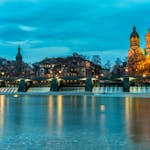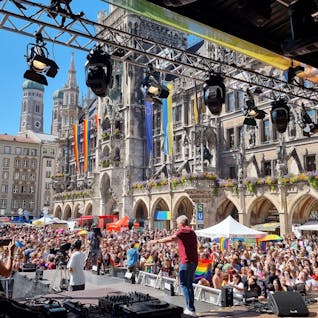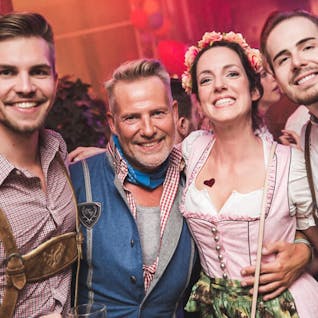Like something out of a fairy tale and gaily drawn picture books, with its uninterrupted streets and squares of original (or reconstructed) baroque, gothic and neoclassical loveliness, Munich has the look and feel of a simpler, bygone age. And then it gets dark and the modern world comes out to play. Yet despite its indisputable reputation for A-list shopping, eating, drinking and, for the most part, cruising, this southern German metropolis remains something of a best-kept-secret destination, o...
Like something out of a fairy tale and gaily drawn picture books, with its uninterrupted streets and squares of original (or reconstructed) baroque, gothic and neoclassical loveliness, Munich has the look and feel of a simpler, bygone age. And then it gets dark and the modern world comes out to play. Yet despite its indisputable reputation for A-list shopping, eating, drinking and, for the most part, cruising, this southern German metropolis remains something of a best-kept-secret destination, often overlooked in favour of European rivals Berlin, London, Paris, Amsterdam, Rome, Barcelona and Madrid. It's most surely worth a visit, especially if you like to shop, eat, drink and cruise, and view serious art and architecture, from the ancient Egyptian to the modern. Gravitas indeed.
Marked by a convoluted, colourful, violent and industrial history (monks, Maximilians, Ludwigs, Nazis and BMWs), with roots in the 12th century, Munich officially became the capital city of the Kingdom of Bavaria in 1806, and four years later staged its first Oktoberfest — the 16-day late September/early October beer-culture event that continues to attract millions and which allows the locals to dress in ways that some might find positively stimulating, whether snug-fitting Lederhosen for the men or bosom-embracing frilly tops for the women. There's a folklorish time warp thing going on here, but the jolly-romp atmosphere is not without its appeal. And while the tradition-heavy Oktoberfest might sound like a straight-specific institution, it's not. Nor is its early-March sibling, the similarly drink-heavy Starkbierfest, which neatly coincides with an annual leather/fetish weekend. Gays go in big for both Bavarian beer fests, and are more than happy to clink glasses and slap and rub thighs with the odd foreigner. Unsurprisingly, Christmas is also a major deal in Munich — there's even a pink-themed variation on the Christmas market — as is the annual gay-themed street festival in Hans-Sachs Strasse, staged on the third Saturday in August.
As a centre of culture and power, Munich really blossomed in the 19th century, then 'thrived' and suffered at the hands of the Nazis. Badly bombed, it nevertheless recaptured its old-world charm, beauty and luxuriousness with detailed postwar reconstruction, and remains relatively wealthy and comfortable if rather homogeneous-seeming (Europeans account for most of its 23%-foreign population). Despite its ranking as Germany's third largest city after Berlin and Hamburg, there's an effortless, genial and village-like quality about it, though negotiating busy tram lines and bike paths will keep you on your toes.
Immediately south of the Altstadt (old town) — the most central, buzzy, beautiful and tourist-heavy of the city's 12 districts — you'll find one of the country's more established gay zones: the Glockenbachviertel (in the Ludwigsvorstadt-Isarvorstadt district), which takes its name from the long-paved-over Glockenbach river. The area's evolution as a gay ghetto of sorts most likely owes something to its red-light-district past and to the theatrical and thespian bent of neighbouring Gärtnerplatz. In short, this is where the action is, with the sinewy Müllerstrasse serving as the main drag, on and off of which dozens of gay bars, eateries, saunas and organisations thrive. Café-bars are also quite common, practically de rigueur, with their relaxed mix of snacking, hanging out, drinking and light cruising. At one end of the Müllerstrasse is Sendlinger Tor U-Bahn (tram and underground stop) and at the other, to the east, is the area around the Gärtnerplatz, where the bar (and bartender, apparently) of the Deutsche Eiche lured arty and out film-maker Rainer Werner Fassbinder (1945–82) and his film crews in the 1970s and early 80s. Fassbinder also lived just opposite the Eiche (now the scene's defining hotel and sauna). Predictably, the lively and liberated Glockenbachviertel has drawn trendies and families in recent years, tweaking the area's profile, for better or worse.
Munich's gay scene is established and comfortable, though less leathery than in ze old days, bereft of a buzzy club scene and sadly lacking a proper lesbian outpost since 2012, when Inge Greguletz's Karotte bar closed its doors after 34 years. Rainbow flags are virtually nowhere to be seen — instead, the more ticklingly iconic and secular-feeling disco ball hangs from the ceiling of nearly every gay establishment — and outdoor cruisers still have their day in the sun, with the Flaucher island, due south of Ludwigsvorstadt-Isarvorstadt, proving particularly popular with both the naked and the clothed. As a full-on gay destination Munich is not quite in the same league as Berlin, but as a sexy-provincial, visually stunning and quintessentially Bavarian city at the foothills of the Alps, it demands to be demystified.
Next Big Things: Starkbierfest (the fetish-flavoured MLC Starkbierfest (like an early-spring version of Oktoberfest) (Thursday 14 to Sunday 17 March); Munich's 2024 Pride-like Christopher Street Day (CSD) celebrations take place between Saturday 8 and Sunday 23 June, with the annual PolitParade (and heaving evening RathausClubbing party at the Neus Rathaus [New Town Hall], Marienplatz 8) on Saturday the 22nd; Oktoberfest (Saturday 21 September to Sunday 6 October, with particular attention to 'Rosa Wiesn' events on the first Sunday and Monday of Oktoberfest: Sunday 22 September in the massive non-gay-specific but hugely gay-popular Pschorr Bräurosl festival tent and the Monday 23 September gay-specific RoslMontag, from 3pm); the Queer Film Festival München (Tuesday 8―Sunday 13 October TBC); and the Pink Christmas market (Monday 25 November to Saturday 23 December TBC), located in the heart of the Glockenbachviertel.




